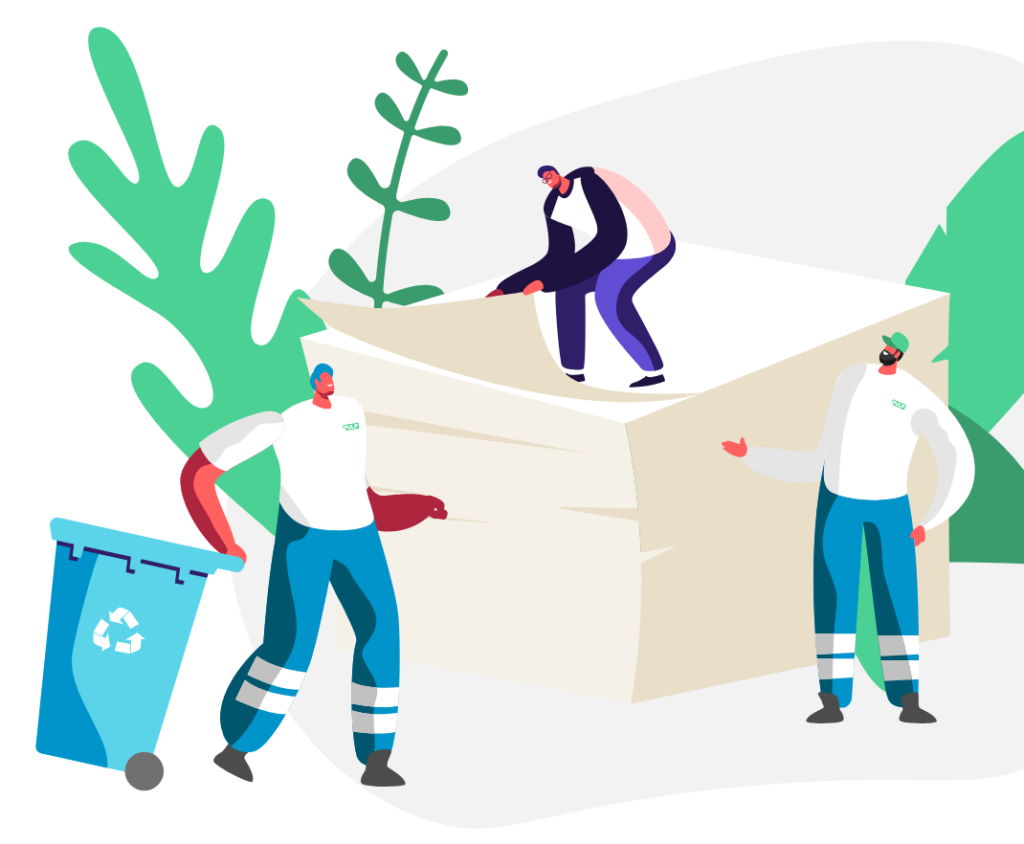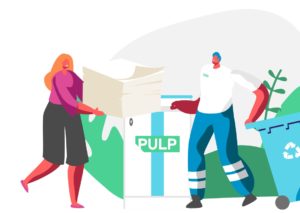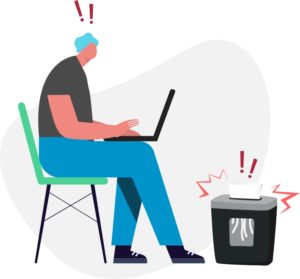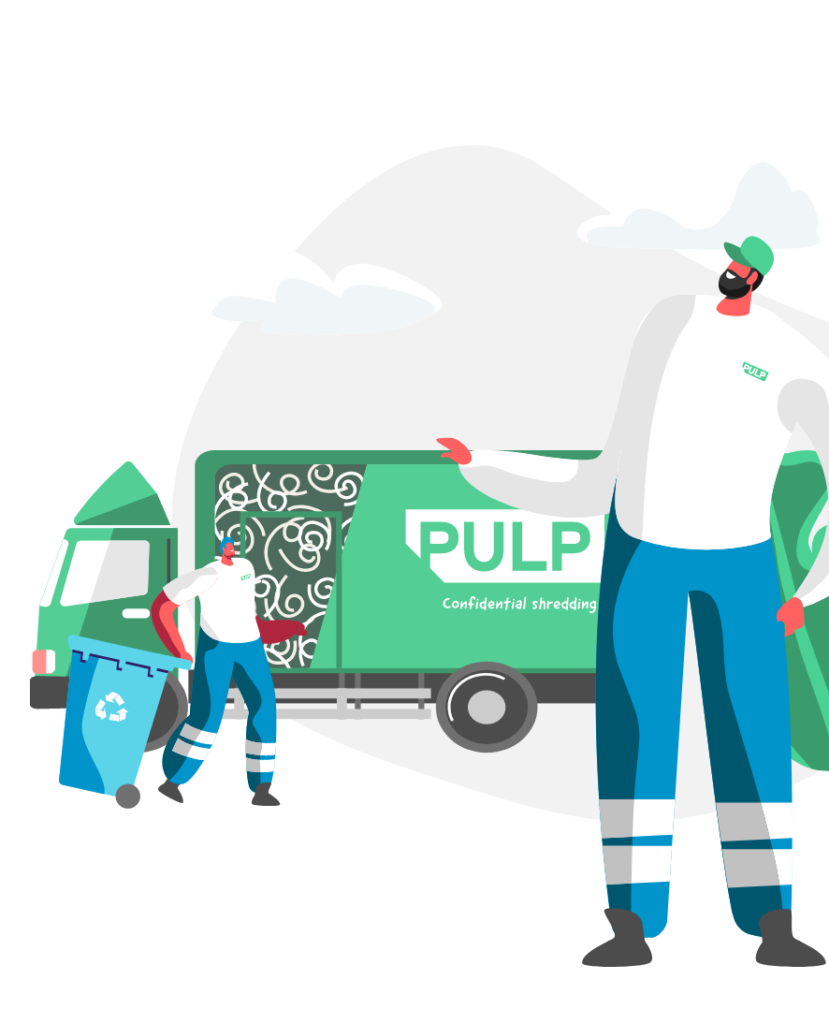
Every individual and organisation has an impact on the environment. Almost everything we do has a knock-on effect in nature. The way we travel, the food we eat, and the products we buy add up. A handy way of measuring our impact on the environment is the carbon footprint concept. Your carbon footprint is the total amount of greenhouse gas emissions you cause. You can generate these emissions directly or indirectly. When you drive your car, the exhaust fumes constitute a direct emission. When you eat meat, the emissions created from the production, packaging and distribution of that meat are indirectly caused by you. So how do we reduce our carbon footprint? The workplace is a great place to start. Here are 20 tips and tricks that we’ve come up with at Pulp.
How To Reduce Your Carbon Footprint
- Transport. Do you travel green? Your commute to and from work could significantly impact your carbon footprint. Did you know that, according to the environmental protection agency, 17.9% of Ireland’s greenhouse gas emissions are caused by transportation? This is an area where there is plenty of room for improvement, and we can all chip in. If you are able, why not cycle to work? Using public transport is another way to reduce your carbon footprint. Even carpooling can have a significant impact! Minor changes to your travel routine can go a long way toward helping the environment.
- Set Recycling Targets. Recycling is hugely important if you aim to reduce your carbon footprint. The more we recycle, the less we can produce specific products from scratch. This reduces the number of greenhouse gasses pumped into the atmosphere by manufacturing and industrial processes. When you recycle paper, you also reduce the demand for tree-felling. Trees are vital for offsetting carbon emissions, so conserving them is key to protecting the earth. In your office, make sure to emphasise the importance of recycling. Keep track of the percentage of your waste you recycle and aim to increase the figure weekly or monthly. In most homes and offices, recyclable waste ends up in the wrong bin from time to time. We can prevent this from happening with a little effort!
- Use Recycled Paper. Did you know that making some modest changes to your supply chain can tremendously impact reducing your carbon footprint? Offices, just like individuals, consume products, and consuming more sustainable products is an effective tool to reduce your carbon footprint. Paper is a great place to start. Printing paper, copy paper, notepads, sticky notes, and countless other paper products can be found in almost every office. Each of these products likely has an alternative made from recycled material. By making this small change, you could have a significant impact!
- Water Usage. Many people don’t realise that water consumption has a considerable effect on the environment. Before we can access water quickly and drink it safely, we have to pump it from our reservoirs, treat it, filter it, and pipe it directly into our homes and offices. This is to say nothing of bottled water, which undergoes many more steps in the manufacturing process before arriving on the shelves of supermarkets. If you consume water responsibly, you and your office can reduce your carbon footprint. You can do this by minimising the amount of tap water you use, refraining from drinking bottled water, and even by reducing the number of times your boil your kettle—you will use far less electricity this way.
- Use a Certified Shredding Provider. Using a certified shredding provider (like Pulp!) is a terrific way to reduce your carbon footprint. Instead of 20 companies using 20 shredders, we can use one shredder to service 20 companies. Think of it as carpooling for shredding! We also guarantee that we recycle 100% of what we shred. Since we opened for business, we’ve saved over 400,000 trees. Our experts will help you recycle more and do it right.
- Energy Efficient Lighting. We all use artificial lighting at home and work, and we consume far more electricity this way than you might think. Up to 17% of household electricity consumption in Ireland is due to lighting. Thankfully, there is a simple way of cutting down on the energy used for lighting: Energy-efficient bulbs. Did you know that LED bulbs last longer, provide a better quality light, and use less electricity than conventional light bulbs? This is a fantastic way to reduce your carbon footprint and get the whole office involved while you’re at it.
- Turn Everything Off. This may seem like an obvious one, but it is common to leave things on by mistake, especially in an office where the responsibility for such things is shared. If you check and make sure the lights are all switched off before you lock up, you could save a lot on electricity bills and reduce your carbon footprint while you’re at it. Make sure you also keep an eye on your computers. Computers consume far more electricity than lights, and people have been known to leave them on in order to avoid booting them up again in the morning.
- Meatless Mondays. Of course, you can go meatless on any day of the week, not just Monday, and it will greatly reduce your carbon footprint. Livestock, particularly cows, generate especially harmful greenhouse gasses such as methane. If we cut back on our meat consumption, even by just a little bit, we can reduce demand for meat products and, therefore, reduce greenhouse gas emissions. This doesn’t just have to be a personal undertaking either, why not involve the whole office? You can do this by sharing vegetarian recipes, hanging up posters and distributing information, or perhaps even holding a seminar.
- Simplify Recycling. Although segregating waste for recycling is simple in theory, it is easy to slip up every now and again. Whether or not a piece of packaging goes in the green bin or the black bin can be a dilemma, and frequently, rubbish ends up in the wrong place. We believe our shredding consoles help alleviate this problem. When you sign up for a regular shredding service, we will install secure consoles around your office where you can deposit documents. We will then come on a regular basis to shred all of the contents on-site in one of our shredding trucks.
- Laptops. Computers use a lot of electricity. An average user’s desktop computer consumes between 60-250 watts. Multiply this by the number of computers you have in the office and you may find the carbon footprint from this alone adds up to a lot. Of course, it is virtually impossible to operate a modern business without computers, but there are still ways to cut back. For example, did you know that laptops consume about half as much electricity as desktops? Encouraging your employees to use laptops over desktops can reduce your carbon footprint. The next time you upgrade or replace your office’s hardware, consider buying laptops instead of desktops.
- Increase Awareness. Reducing your carbon footprint at work is a collaborative effort. It works best when everyone is involved. Every individual at your company has an impact on the environment due to actions that they personally take. Therefore, raising awareness of the various green initiatives you are taking will amplify their effects. For example, if you plan to increase recycling, make sure to speak to your employees and colleagues and bring them on board. Hanging up signs, distributing the occasional memo, and a conversation here and there will have a huge impact as you try to reduce your carbon footprint.
- Waste Reduction. Recycling is a crucial component in your toolkit as you go about reducing your organisation’s carbon footprint. The more of your waste that you can recycle instead of discard, the better. However, you should also ask how much of that waste is really necessary in the first place. By looking over the products your office consumes on a regular basis, it should be possible to find things that you can replace with environmentally friendly alternatives, or cut out altogether. For example, almost all restaurants, cafés and catering businesses in Ireland have switched to paper-based straws instead of single-use plastic versions.
- Reusable Cups. This point ties into the previous one about waste reduction, but reusable cups deserve special mention. Across Ireland, offices’ use of coffee machines and water coolers is widespread. In both of these cases, it is common to use disposable cups. These cups are a huge source of waste. By having your employees bring their own flasks and bottles, you can solve this problem. Another way of helping is to keep the office kitchen well stocked with mugs and glasses. This small change will have a huge impact and is a great way of reducing your carbon footprint.
- IT Destruction. Did you know that one of the services Pulp offers is IT Destruction? We can securely dispose of old tapes, hard drives, disks, phones, computers and laptops. But why is IT destruction relevant in the fight for a greener future? Firstly, we dispose of all electronic equipment according to environmental regulations. That means that we recycle everything that can be recycled. Secondly, older electronic equipment tends to consume more power and be less energy-efficient than new equivalents. Moving old electronics along helps the environment,
- Compost Food Waste. Food waste is a huge contributor to our collective carbon footprint. This is because food waste that we empty into landfills produces a higher quantity of greenhouse gasses than compost. It is tempting to empty food scraps into the bin. However, composting it instead is far better for the environment. It is quite simple to make this change. A compost pot beside the kitchen sink in your office will go a long way toward reducing your carbon footprint. Once people can see how much food they are throwing away, they are also more likely to reduce the amount that they are buying. Therefore, composting at the office can reduce your carbon footprint in two ways!
- A Paperless Office? Many people assume that a paperless office is a way forward in terms of becoming more environmentally friendly. Indeed, reducing paper consumption is good for the environment, but how do businesses compensate for this? They do it by storing more information digitally. This can be even worse for the environment. Controversial data centres have been in the news recently because they consume so much electricity. We need servers like these to store information online. Therefore, “going paperless” might not reduce your net carbon footprint. A better strategy is to buy recycled paper, recycle all the paper you use, and destroy as much irrelevant data as possible. We can help you with all of this.
- Once Off Summer Clear Out. Do you have heaps of useless files in your workplace? Do you want to get rid of them without committing to a regular shredding service? If so, Pulp’s Once Off Shredding Service is for you. This is the ideal way to recycle a large quantity of paper in bulk and reduce your carbon footprint. Please speak to us today to arrange a quote.
- Recyclable Material. Recycling isn’t just about offsetting waste. Recyclable material is a productive, green resource that can be put to good use. When you recycle files and papers from the office, you’re not simply preventing them from going into landfills; you’re providing raw materials that we use to create other products at a much lower cost to the environment. If you have old files in your office, shredding them isn’t just about clearing up space, it’s about contributing to a new, sustainable production cycle.
- Shred-All Policy. In a previous blog, we talked about the security benefits of a shred-all policy, like lessening the chances of identity theft. A shred-all approach means that all unnecessary paper is disposed of straight away. Implementing a shred-all policy is also a sure-fire way of reducing your carbon footprint. As discussed in the previous point, the more paper you recycle, the more of your carbon footprint you offset. Shred-all means you will reduce your carbon footprint on an efficient and consistent basis.
- Carbon Offsetting. Carbon offsetting is a great way for companies to reduce their carbon footprint. This method doesn’t reduce your carbon footprint per se but allows you to balance the scale by doing something good for the environment. By donating to local charities that plant trees and promote biodiversity, you can reduce your net carbon impact.
As you can see, there are plenty of little changes we can all make to reduce our carbon footprint at work. Some of these ideas may seem small, but when it comes to saving the planet, every little helps. At Pulp, we’re proud that our services can help protect the environment. Get in touch today to find out more about our services.




